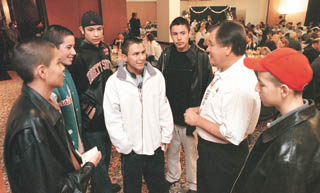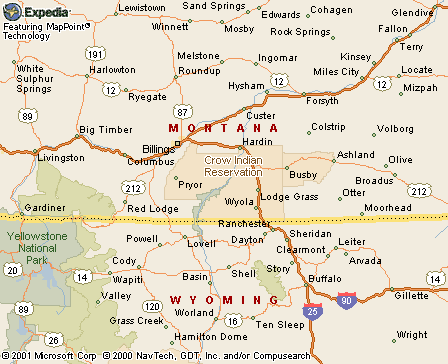|
|
Canku Ota |
|
|
(Many Paths) |
||
|
An Online Newsletter Celebrating Native America |
||
|
February 9, 2002 - Issue 55 |
||
|
|
||
|
Gold-medal Runner Billy Mills Speaks in Advance of Torch Relay |
||
|
by Susan Olp of the
Billings Gazette Staff-January 26, 2002
|
||
|
credits: Larry Mayer/Gazette
staff
Olympic gold medalist Billy Mills, second from right, talks with members of the state champion Plenty Coups High School cross country team, from left, Matthew Flat Lip, Winston Caufield, Wesley Spotted Bear, Nathaniel Left Hand, Jerome Big Hail and Scott Flat Lip |
 Long
before Billy Mills gave his inspiring talk on Friday morning at the Northern
Hotel, he managed to touch the life of at least one young man in the audience. Long
before Billy Mills gave his inspiring talk on Friday morning at the Northern
Hotel, he managed to touch the life of at least one young man in the audience.
A 1964 Olympic Gold medalist, Mills came to Billings to help kick off the events leading up to Monday’s arrival of the Olympic Torch. About 200 people came to the breakfast to hear Mills speak. One of them, Matthew Flat Lip, a senior at Plenty Coups High School, arrived with his cross country teammates. This is the second year the Plenty Coups Warriors have taken the State C boys cross-country championship. Matthew Golden Moments and the other Plenty Coups runners chatted with Mills before the Olympian gave his talk. That’s when the Plenty Coups runner found out this wasn’t the first time the two had met. “The first time I ever met Billy Mills, my mom was pregnant with me,” Matthew said in a later interview. “It made me feel good that he remembered.” Matthew said he started running when he was 10. “I woke my dad up at 5 o’clock and told him I wanted to run,” he said. His father set up a course in the pasture the family owns, and Matthew would run a mile or two at a time. By the time he was a sophomore in high school, he and two other Plenty Coups runners competed – despite not having enough runners for a team – and were named to the all-state team. Last year, Matthew wrote a report about Billy Mills. “I learned about how he worked hard,” Matthew said. “I wanted to work hard like him every day, so I did.” Mills, 63 and a Lakota Sioux, remains the only American to have won the 10,000-meter run in the Olympics. He accomplished the feat at the 1964 Tokyo games. Before Mills got up to talk, audience members first heard the last moments of a radio broadcast of the race and then saw a black-and-white television tape of the event. Both revealed the excitement of the race, as Mills surged forward at the very end to win. The breakfast audience cheered as Mills crossed the finish line. Then, he stood up and captivated his audience, weaving his life history with key advice from his father. “I truly felt as if I had wings on my feet,” Mills said of the last seconds of the race. If Mills has experienced great joy, he has also known the depths of despair. He grew up in poverty on the Pine Ridge Indian Reservation in South Dakota. His mother died when he was still a boy, and he was orphaned at age 12. He was sent to boarding school in Lawrence, Kan., and started running track after he failed to make the football team. Though a three-time NCAA All-American cross-country runner, Mills told Friday of being asked to step out of a photograph because of the color of his skin. He was excluded from a college fraternity for the same reason. Mills talked about how dangerous perceptions can be. He told of being in a restaurant at the 1992 Barcelona Olympics with his wife and daughter. Some American journalists at a nearby table were talking about who the greatest Olympic distance runner was, and Mills’ name came up. Someone asked what had become of Mills. He said it felt like a knife in his heart when one man spoke up. “I’ll tell you where Billy Mills is,” the man said. “He’s just like all the rest of the Indians. They’re quitters. He’s an alcoholic. He’s drug-addicted. That’s the way they all are.” When Mills heard those words, he was speechless. “My daughter said, ‘Daddy, please say something,’ but I could not speak,” Mills said. “She stroked my arm and said, ‘Daddy, you’re my hero. You always seem to have wings of an eagle.’” Her words made Mills think back to an earlier time when his father told Mills that he had broken wings, but knew that one day his son would have the wings of an eagle. The father said that hate and bitterness spawned by racism would only destroy Mills. If Mills could find the dream within himself, that would heal him, his father said. For Mills, that dream was running. Mills stood and told the man who he was. He said that, by his own choice, he had never imbibed alcohol or taken drugs. The man was apologetic. But he also responded that Mills shouldn’t be so sensitive. Mills contrasted the pain of misperceptions with the unity that comes from the diversity of the Olympic games. “The Olympics represents character, beauty and hope of people worldwide,” Mills said. He challenged people at the breakfast to follow the example of the Indian warrior who seeks to embrace qualities in his life of bravery, fortitude, generosity and wisdom. “Follow those in your life, and develop the uniqueness within you,” Mills said.
|
|
|
||
|
|
||
| Canku Ota is a free Newsletter celebrating Native America, its traditions and accomplishments . We do not provide subscriber or visitor names to anyone. Some articles presented in Canku Ota may contain copyright material. We have received appropriate permissions for republishing any articles. Material appearing here is distributed without profit or monetary gain to those who have expressed an interest. This is in accordance with Title 17 U.S.C. section 107. | ||
|
Canku Ota is a copyright © 2000, 2001, 2002 of Vicki Lockard and Paul Barry. |
||
|
|
|
|
|
The "Canku Ota - A Newsletter Celebrating Native America" web site and its design is the |
||
|
Copyright © 1999, 2000, 2001, 2002 of Paul C. Barry. |
||
|
All Rights Reserved. |
||

